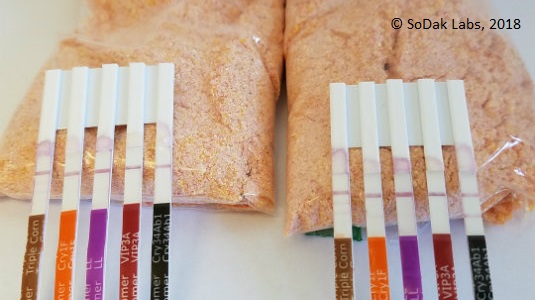Corn Services
- Corn Germination
- Corn Vigor - 40F or 50F Cold
- Corn Vigor - 50F Saturated Cold
- Corn Vigor - Accelerated Aging (AA)
- Corn Herbicide Traits
- Corn Insect Traits
- Corn Adventitious Presence (GMO)
- Corn Genetic Purity
- Corn Purity and Noxious Weed Examination
- Corn Pericarp Damage
- Corn Winter Grow Outs
- Corn Seed Count
- Corn Tetrazolium
- Waxy Corn Testing

Flour ready for testing
Method
This test is intended to test conventional seed for the absence of herbicide and insect traits. Herbicide bioassays are used to screen a large number of seeds (seed needs to be viable) and keep cost low. Insect traits are screened using an ELISA technique. Number of seed tested is typically 1200 or 2400 seed.
AP- Seed- Percentage of trait tolerant seedlings are reported for herbicide bioassays. Insect traits (Mon88017, Mon810, B+11, TC1507, MR162, DAS59122-7, Mon 89034) aare tested for the proteins produced from the transgenic event in 3 pools of 400 of 800 ground seed for a total of 1200 or 2400 seeds.
AP- Grain – Kernels are grouped into “pools” (800 kernels typically), ground into flour, proteins extracted and tested with ELISA kit for proteins produced by the transgenic event, including Glyphosphate and Liberty herbicide proteins.
PCR Testing – Seed are grouped into "pools" (3000 seed typically). DNA is extracted from ground material and tested for the presence of standard DNA sequences utilized with transgenic insertion.
What is Reported
AP- Seed- An estimated purity is reported based on positive responses within "pools" and use of the statistical analysis program "Seedcalc".
AP- Grain - Based on the number of "pools" with positive or negative results and the total number of seed tested, an estimate is generated of the purity of the submitted sample.
PCR Testing - Based on the number of "pools" with positive or negative results and the total number of seed tested, an estimate is generated of the purity of the submitted sample.
Value of Results
AP testing provides the client with an estimated level of unintended GMO traits in the seed, grain, or product tests.
Resources & Research
40F Cold Test for Early Planted Corn
Adventitious Presence (AP) Testing of Seed or Grain
Bulk Electrical Conductivity Test
Corn Pericarp Damage & Starter Fertilizers
Maize Hybrid Purity Testing Services
PCR Confirmation of Non-Trait Seeds/Seedlings
Standardizing Corn Terminology
Agronomically Accurate Seed Testing Results
SoDak Lab's goal is to deliver fast, accurate, and diagnostic seed testing services.